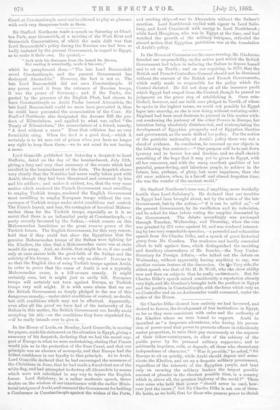Sir Stafford Northcote's tone was, if anything, more decidedly hostile
than Lord Salisbury's. He declared that our troubles in Egypt had been brought about, not by the action of the late Government, but by the action,--" if it can be called so,"—of the present Government, by its vacillation and its indecision,. and he asked for time before voting the supplies demanded by the Government. The debate accordingly was prolonged through Tuesday, Wednesday, and Thursday, when the vote was granted by 275 votes against 19, and was rendered interest- ing by two very remarkable speeches,—a powerful and exhaustive speech from Sir Charles Dilke, and a speech of great historical grasp from Mr. Goschen. The weakness and hardly concealed. effort to talk against time, which distinguished the rambling and desultory observations of Mr. Bourke,—the Tory Under- Secretary for Foreign Affairs,—who talked out the debate on Wednesday, without apparently having anything to say, was another curious feature of the discussion. On tiso Tory side,the ablest speech was that of Sir H. D. Wolff, who cks show ability now and then on subjects that he really un.darstands. But Sir Charles Dilke's speech raised considerably a reputation already very high, and Mr. Goschen's brought both the position in Egypt and the position in Constantinople, with the force which only an ex-Controller and an ex-Ambassador could command, under the notice of the House.


































 Previous page
Previous page